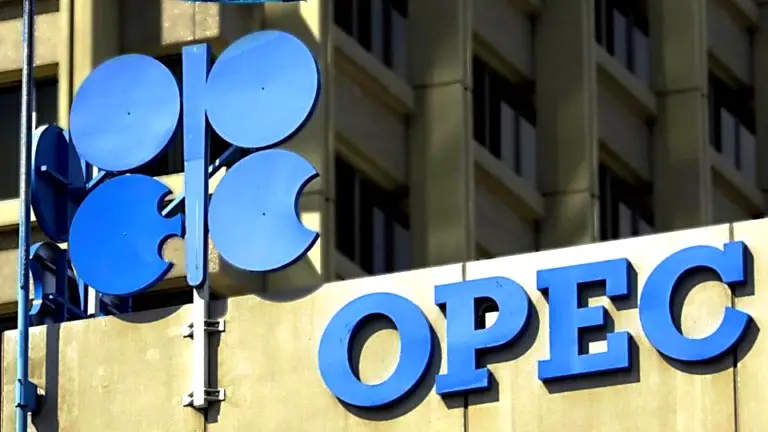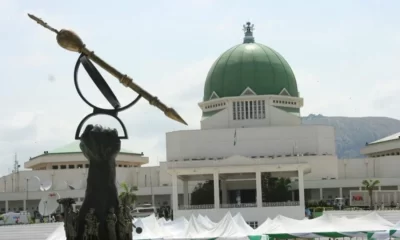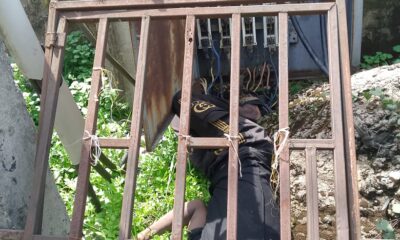Business
Refineries: Reps Call For Forensic Audit Of N11.34trn Spent On Rehabilitation
Published
11 months agoon
By
Editor
The House of Representatives has demanded forensic audit of all rehabilitation projects at Port Harcourt, Warri and Kaduna refineries.
The demand followed the consideration of the recommendations of a report by its ad-hoc committee on the state of refineries and the need to ascertain the actual daily consumption of Premium Motor Spirit, PMS, otherwise known as petrol, in Nigeria.
It will be recalled that the consideration of the report was deferred when presented last week because the chairman of the committee of the whole and deputy speaker, Ahmed Idris-Wase, last week told the committee chaired by Ganiyu Johnson to give clear cut recommendations based on its specific mandate.
Re-presenting the report at plenary, yesterday, Johnson said the findings of the committee revealed that the rehabilitation of the three refineries had cost the nation N11.35 trillion in 13 years, beginning from 2010.
READ ALSO: Fuel Subsidy Hits N1.593tn, Refinery Rehabilitation Gulps N54.66bn
He said the refineries became unproductive from 2010, making a range of losses, with Port Harcourt put at 7.6 per cent losses to the tune of N132.52 billion from 2012; Warri at 6 per cent losses amounting to N111.37 billion from 2014 and Kaduna at 10 per cent losses to the tune of N122.62 billion from 2014.
The report stated that from 2010 to 2019, the refineries performed sub-optimally, with an annual combined capacity of less than 30 per cent.
According to the report, the NNPC obtained an executive approval and shutdown the refineries for comprehensive rehabilitation to restore the plants to a maximum of 90 per cent utilisation.
The report said total losses from the non-functional refineries since 2010 were placed at N366.52 billion, while the total cost of operations and running them from 2010–2020 stood at N4.80 trillion.
READ ALSO: Nigeria, Others Need $7.5bn To Deepen LPG Usage – Refiners
It further indicated that subsidy payments totalling N5.9 trillion was made from 2010 to 2020.
The committee, however, recommended that the NNPCL fast tracked the rehabilitation programme of the refineries empowered by the legislative intent for a deregulated business environment and restore the refineries to a minimum 90 per cent nameplate capacity utilisation.
Vanguard reports that the committee also recommended that NNPCL and the contractor (Tecnimont SPA of Italy) be urged to ensure that phase one of the rehabilitation works in Refinery Area 5 of the Old Port Harcourt Refinery, OPHR, with the processing capacity of 60,000 barrels per day earlier expected to be restored to 54,000 barrels per day of processing capacity representing 90 per cent capacity utilization by March, 2023, should unfailingly meet the new target date of September, 2023.
READ ALSO: Probe Missing $2.1bn, N3.1trn Of Subsidy Payments Or Face Legal Action, SERAP Tells Tinubu
It asked that a bank (names withheld) refund to the nation the total sum of US$438,012.44 paid them as retainer fees from 2017-2018 as the financing advisory contract for the rehabilitation of the three refineries was not successful and was suspended due to the financing consortia not reaching agreeable terms for the transaction with the NNPC.
Other recommendations include “that the NNPCL and the Contractor (Tecnimont SPA of Italy) be further urged to ensure that phase two of the rehabilitation works in Refinery Areas 1&2 of the New Port Harcourt Refinery (NPHR), with an installed capacity of 150,000 barrels per day be restored to the estimated processing capacity of 135,000 barrels per day.”
VANGUARD
You may like


JUST IN: CJN To Receive N5.39m Monthly As Reps Pass Judicial Officers Salaries Bill


JUST IN: Reps Extend 2023 Supplementary Budget’s Implementation Period


Reps Summon Edun, RMAFC Over Judges Poor Pay


Nigerian Lawmakers Told to Remove Immunity For President, Governors


Reps Threaten Warrant Of Arrest On IOCs’ Chiefs


Reps Probe Use Of N200bn On Suspended 2023 Census
Business
CBN Gives New Directive On Lending In Real Estate
Published
2 days agoon
April 17, 2024By
Editor
The Central Bank of Nigeria, CBN, has released a new regulatory directive to enhance lending to the real sector of the Nigerian economy.
The directive, issued on April 17, 2024, with reference number BSD/DIR/PUB/LAB/017/005 and signed by the Acting Director of Banking Supervision, Adetona Adedeji, signifies a notable shift in the bank’s policy towards a more contractionary approach.
In line with the new measures, the CBN has reduced the loan-to-deposit ratio by 15 percentage points, down to 50 per cent.
This move aligns with the CBN’s current monetary tightening policies and reflects the increase in the Cash Reserve ratio rate for banks.
READ ALSO: JUST IN: CBN Gov Sacks Eight Directors, 32 Others
The LDR is a metric used to evaluate a bank’s liquidity by comparing its total loans to its total deposits over the same period, expressed as a percentage.
An excessively high ratio may indicate insufficient liquidity to meet unexpected fund requirements.
All Deposit Money Banks are now mandated to adhere to this revised LDR.
The CBN has stated that average daily figures will be utilised to gauge compliance with this directive.
Furthermore, while DMBs are encouraged to maintain robust risk management practices in their lending activities, the CBN has committed to continuous monitoring of adherence and will adjust the LDR as necessary based on market developments.
READ ALSO: JUST IN: CBN Increases Interest Rate To 24.75%
Adedeji has called on all banks to acknowledge these modifications and adjust their operations accordingly. He emphasised that this regulatory adjustment is anticipated to significantly influence the banking sector and the wider Nigerian economy.
The circular read in part, “Following a shift in the Bank’s policy stance towards a more contractionary approach, it is crucial to revise the loan-to-deposit ratio policy to conform with the CBN’s ongoing monetary tightening.
“Consequently, the CBN has decided to decrease the LDR by 15 percentage points to 50 per cent, proportionate to the rise in the CRR rate for banks.
“All DMBs must maintain this level, and it is advised that average daily figures will still be applied for compliance assessment.
“While DMBs are urged to sustain strong risk management practices concerning their lending operations, the CBN will persist in monitoring compliance, reviewing market developments, and making necessary adjustments to the LDR. Please be guided accordingly.”

The Dangote Petroleum Refinery has announced a reduction in the price of Automotive Gas Oil, popularly called diesel, from N1,200/litre to N1,000/litre.
It announced this in a statement issued on Tuesday by its spokesperson, Nduka Chiejina.
The statement read in part, “In an unprecedented move, Dangote Petroleum Refinery has announced a further reduction of the price of diesel from N1,200 to N1,000/litre.
READ ALSO: NNPP Faction Suspends Kano Governor For Six Months
“While rolling out the products, the refinery supplied at a substantially reduced price of N1,200/litre three weeks ago, representing over 30 per cent reduction from the previous market price of about N1,600/litre.
“This significant reduction in the price of diesel at Dangote Petroleum Refinery is expected to positively affect all the spheres of the economy and ultimately reduce the high inflation rate in the country.”
According to The PUNCH report, last week, oil marketers called on the refinery to reduce its diesel price, as they urged managers of the facility to sell at N850/litre.
Details later…
Business
Nigeria’s Oil Production Drops Again, Now 1.23mbpd – OPEC
Published
1 week agoon
April 12, 2024By
Editor
Nigeria’s crude oil production witnessed the second consecutive monthly decline since the beginning of this year, as it dropped to 1.231 million barrels per day in March, the Organisation of Petroleum Exporting Countries stated on Thursday.
OPEC disclosed this in its latest Monthly Oil Market Report for April 2024, stating that crude oil production details which it got through direct communication from Nigeria showed that the country pumped less oil in March when compared to what was produced in February.
Data from the report indicated that Nigeria produced 1.322 million barrels per day of crude in February this year, but this dropped to 1.231mbpd in March, representing a plunge of 91mbpd.
The report further stated that the country had produced 1.427mbpd of crude in January, but this was not sustained in February as it dropped in that month, while the southward oil production continued in March.
OPEC data, however, showed that the country’s average crude oil production in the first quarter of 2024 was 1.327mbpd, higher than the 1.313mbpd average oil production in the fourth quarter of 2023.
Nigeria’s first quarter oil output in 2024 was also higher than the 1.201mbpd average production in the third quarter of last year.
READ ALSO: Oil Production Rises 26.57m Bpd In February — OPEC
Oil theft and pipeline vandalism have dealt severe blows on Nigeria’s oil production, limiting the country’s output and making it fall below the volume approved for Nigeria by OPEC.
The PUNCH reported on Wednesday that the Nigerian National Petroleum Company Limited recorded 155 oil theft incidents in one week.
The report that stated the company revealed that during the review period, 53 illegal pipeline connections and 36 illegal refineries were uncovered in the Niger Delta.
“Between March 30 and April 5, 2024, a total of 155 incidents were recorded across several locations in the Niger Delta region from various incident sources,” the firm stated.
In a summary of the incidents, NNPCL stated that it recorded 53 illegal connections, discovered 36 illegal refineries and 32 wooden fibre boats, identified 14 pipeline vandalism cases, eight vessel infractions and four oil spills, as well as made seven vehicle and one vessel arrests.
Some of the incident sources include the Nigeria Agip Oil Company, Tantita Security Services Ltd, NNPCL Command and Control Centre, Shell Petroleum Development Company, NNPCL 18 Operating Ltd, among others.
READ ALSO: Oil Drops Further After OPEC Delay With Asian Stocks Mixed
Providing additional details, the company said, “In the past week, 32 wooden boats conveying stolen crude and illegally refined products were seized and confiscated in Rivers and Delta states.
“On land, seven vehicles loaded with stolen crude were arrested in Imo, Delta and Rivers states. 53 illegal connections were uncovered between March 30 and April 5, 2024 in Bayelsa, Rivers and Delta states.
“14 cases of vandalism were also recorded in Rivers, Bayelsa and Delta states, while illegal storage sites where stolen crude and illegally refined products are kept were uncovered in Akwa Ibom, Bayelsa, Rivers and Delta states.”
The national oil company also stated there were clusters of illegal refineries in Abia State, as activities of oil thieves had devastated the effected environments in the state.
It said 36 clusters of the illegal refineries were discovered in the past week across several locations in Rivers and Abia states.
“Four cases of oil spills due to activities of vandals were recorded in the past week,” NNPCL stated, adding that in Rivers State, oil leaks from a wellhead is destroying aquatic lives.
NNPCL stated that 38 suspects were arrested during the week under review, stressing that the national oil company would not back down on the war against crude oil theft until the menace is eradicated.
READ ALSO: OPEC Cuts Nigeria’s Oil Output By 20.7% To 1.38 mb/d
Nigeria has been losing trillions of naira to crude oil theft, a development that has made some international oil companies to divest from onshore to deep offshore oil fields, while others have exited the country.
In November 2023, for instance, The PUNCH reported that the Federal Government revealed that more than N4.3tn worth of crude oil was stolen in 7,143 pipeline vandalism cases within a period of five years.
The report stated that the government disclosed this at the Nigeria International Pipeline Technology and Security Conference in Abuja, with the theme, ‘Bolstering Regulations, Technology and Security for Growth.’ The conference was organised by the Pipeline Professionals Association of Nigeria.
In a presentation at the conference by the Nigeria Extractive Industries Transparency Initiative, a Federal Government agency, the organisation revealed that oil theft and losses in Nigeria had become a national emergency.
The Executive Secretary, NEITI, Ogbonnaya Orji, said oil theft was an emergency that posed serious threat to oil exploration and exploitation with huge negative consequences on economic growth, business prospects and profit earnings by oil companies.
Providing data from the agency’s reports to back his claims, he said, “NEITI disclosed that in the last five years, 2017 to 2021, Nigeria recorded 7,143 cases of pipeline breakages and deliberate vandalism resulting in crude theft and product losses of 208.639 million barrels valued at $12.74m or N4.325tn.
“NEITI reports also disclosed that during the same period Nigeria spent N471.493bn to either repair or maintain pipelines.”
PUNCH

Bandits Seek Peace Talks With Zamfara Gov In Viral Video

JUST IN: More Trouble For Bello As Immigration Service Places Ex-Kogi Gov On Watchlist

Police Rescue Three Toddlers Locked Up In Lagos Home

Woman S*xually Abuses Child, Films It In Viral Video

Jnr Pope: ‘That Guy No Suppose Knack Bell’ – Boat Captain Narrates His Own Side Of Story [VIDEO]

Junior Pope: ‘Our Boat Captain Hit Fisherman’s Canoe’ – Survived Actor Narrates How It Happened [VIDEO]
Trending

 Metro4 days ago
Metro4 days agoJunior Pope: Photos From Funeral Of Makeup Artiste, Abigail Frederick

 News5 days ago
News5 days agoVideo: Moment Pastor Enenche Sent Lady Away For Giving False Testimony On The Altar

 Metro2 days ago
Metro2 days agoTwo Soldiers Arrested For Allegedly Stealing Armoured Cables At Dangote Refinery In Lagos

 News4 days ago
News4 days agoBREAKING: APC Suspends National Chairman Ganduje

 Headline4 days ago
Headline4 days agoUS-based Nigerian Bodybuilder Dies 18 Days After Being Shot By Wife

 News3 days ago
News3 days agoBREAKING: FG Begins Disbursement Of N200bn Palliative Loans

 Headline2 days ago
Headline2 days agoB-I-Z-A-R-E: Woman Wheels Dead Uncle’s Corpse Into Bank To “Sign Off” Loan In Her Name [VIDEO]

 Metro3 days ago
Metro3 days agoTransformer Vandal Met Waterloo, Electrocuted In Benin

 News4 days ago
News4 days agoPastor Enenche Under Fire For Accusing Church Member Of Fake Testimony

 Metro5 days ago
Metro5 days ago‘Side Chick’, Family Members Allegedly Attack Lover’s Wife























